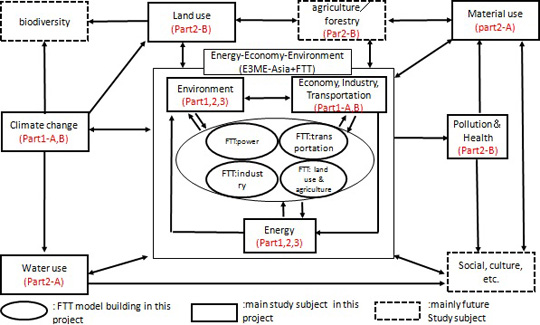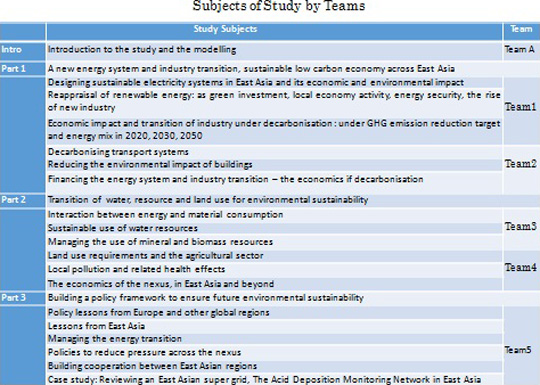東アジアの持続可能な発展のためのエネルギー・環境財政のグリーン改革

研究目的と概要ページ
研究目的と研究概要
本研究会の活動目的は、日本・中国・韓国・台湾を中心とする東アジア地域における持続可能な発展のための環境・エネルギー政策に関する研究です。著書、論文、シンポジウム、ワークショップ、学会報告、講演会など様々な学術活動を通じて、その成果を社会に広くフィードバックしています。これらの活動を通じて、将来的には東アジアエネルギー・環境共同体(たとえば、「東アジアエネルギー環境委員会(仮称)」、東アジアスーパーグリッド、東アジア低炭素ネットワークなど)の構築、そして究極的には東アジアの平和に貢献する基盤的研究として位置づけます。
・第1期目の主な研究活動(2000年〜2005年)として、東アジア地域の環境問題と環境政策に関する基礎実態調査を行い、また同地域において循環型社会を目指すための政策協調と制度設計に関する研究を行いました。
・第2期目の主な研究活動(2006年〜2008年)として、同期間中に科研(基盤研究(B))アジアの環境問題と環境賦課金制度-持続可能なアジアに資する制度進化の条件と課題)の支援により、東アジア地域における環境賦課金制度の運用経験、成果、課題に関する国際比較分析を行い、これらを持続可能なアジアに資する有効な制度へと進化させるための条件と課題を明らかにしました。
・第3期目の主な研究活動(2009年〜2012年)として、同期間中に科研(基盤研究(B))東アジア環境共同体に向けた環境法・行政・財政に関する国際比較研究)の支援により、東アジア地域における環境法・規制および財政の運用実績・成果・課題に関する国際比較分析を通して、東アジア環境共同体と呼ぶべき緊密な環境協力システムを構築し、同地域を持続可能な発展へ導いて行くための方向性を示唆しました。
・第4期目の主な研究活動(2013年〜2015年)として、同期間中に科研(基盤研究(A))東アジアの持続可能な発展のためのエネルギー・環境財政のグリーン改革)の支援により、各国のエネルギーシステムおよび低炭素制度改革が、自国および隣国の環境と経済に与える影響を実証モデル分析により評価したうえで、エネルギー利用の持続可能性と安全、温室効果ガスの削減、グリーンビジネスの振興などを促すように、この地域の持続可能な発展を目指した関連制度改革の方向性を明らかにしました。
その際に、欧州で環境税制改革等の分析に活用されてきたマクロ計量モデルE3MG (An Energy-Environment-Economy Model at the Global level)を、英国Cambridge Econometricsの協力を得て、独自のE3ME-Asiaモデルとして再構築し、東アジアの関連制度改革の効果と相互影響を定量的に分析・評価しました。
現在進めている第5期目の主な研究活動(2016〜2019)は、同期間中に科研(基盤研究(A))東アジアの持続可能な未来に向けたエネルギー、資源、土地利用の大転換と制度改革)の支援により、東アジアの持続可能なエネルギー・資源・土地利用のための制度改革の方向性を明らかにすることを目的とします。
日本・中国・韓国・台湾を中心とする東アジア地域は、エネルギー・環境・資源利用の側面でも相互依存を深めています。この地域の経済発展によるエネルギー、水及び鉱物資源、土地利用が環境に与える中長期的(2050年)影響、及びエネルギー・環境・資源政策の経済への波及効果等を、理論的・実証的モデルにより定量的に評価し、持続可能な未来に向けたエネルギーシステム、産業技術、資源及び土地利用のための関連制度改革の方向性を明らかにします。本研究グループがこれまでの科研費プロジェクトで発展させてきたE3ME-Asiaモデル(Cambridge Econometricsと共同)とFTTモデル(Cambridge大学4CMR研究所)を、一層進化させて分析に用います。

▲エネルギー・資源消費と汚染物質排出の環境・社会影響関係
(注)ブルーの部分は経済活動に投入される資源、黄色の部分は経済活動の結果が及ぼす影響を指す。
Improving the Energy-Water-Material Nexus toward sustainable future in East Asia Brief Introduction
As global populations and incomes increase throughout the world, pressure on environmental resources is also increasing. Although the problem is global, East Asia, which includes the world’s second and third largest global economies and the world’s largest source of greenhouse gas emissions, will play a key role in shaping the world that we live in.
In the run-up to the Paris COP, policy makers across the world are turning their attention to measures to reduce greenhouse gas emissions. However, while substantial reductions in greenhouse gas emissions are necessary to mitigate climate change, the problem is in reality far more complex. Issues of energy consumption are intertwined with those of land use, water and the consumption of other materials ? this has been described as the energy-water-material-food ‘nexus’. Researchers are only now beginning to grapple with this problem and policy makers across the world do not yet have the necessary tools with which to understand the issue.
In this study we apply new advanced modelling techniques to help develop an understanding of the key issues and interactions, including socio-economic impacts. Using these econometric models, we will make forecasts to 2050 based on a business-as-usual scenario for East Asia, covering industrial production and the use of energy, water, key mineral resources, and land as well as agricultural production. Further, we will calculate emissions of environmental pollutants such as CO2 and particulate matter accompanying the use, production, and consumption of the above resources, and we will assess the impacts of health damage and declining land use on agriculture. Assuming increased energy and resource productivity, we will examine the impact of introducing various policy packages aimed at limiting pollution accompanying the use of these resources (e.g., carbon pricing and taxes on non-renewable resources, water resources, virtual water transfers, and unsustainable land use). And we use CGE model on some important issues for comparative studies with the results of E3ME-Asia analyses.
The final section shows that cooperation across the East Asian region will be essential to meeting the challenges posed by the nexus. The research will measure, evaluate, and compare the impacts of introducing policies at the individual country level as well as simultaneous adoption of policies throughout East Asia on the efficient use of energy, water and other resources, and land and agricultural productivity and on the suppression of emissions of various pollutants. It is aimed at policy makers who will ultimately be responsible for meeting these challenges while ensuring economic prosperity for people across the region.

▲Nexus of the Study
(※クリックすると拡大します/ Click to enlarge )
Contents
Welcome
本研究会は、日本・中国・韓国・台湾を中心とする東アジア地域の環境・エネルギー政策に関心をもつ研究者が集まって、2000年に結成された自主的研究組織です。メンバーの出身国の多様性が当初からの特徴のひとつです。これまで研究会の活動目的を「東アジア地域の持続可能な発展に資する環境・エネルギー政策研究」に置き、3度にわたって文科省から科研費の支援を受けて、研究成果を積み重ねてきました。現在は日本国内に固定メンバー16人、海外研究ネットワーク26人(韓国10人、中国6人、台湾4人、ASEAN2人、イギリス4人)の組織となっています。

